Easter Sunday massacre: Sri Lankan terrorists ‘had international help’
Sri Lanka’s defence minister says the Easter Sunday massacre was retaliation for the New Zealand mosque shootings as the death toll from the bombings hits 321.
World
Don't miss out on the headlines from World. Followed categories will be added to My News.
The Sri Lanka Easter massacre was carried out in retaliation for the Christchurch mosque shootings, the country’s defence minister says.
Sri Lanka’s state minister of defence Ruwan Wijewardene told parliament the early findings of the ongoing probe found that the suicide bombings were committed in revenge for the Christchurch shootings at two mosques, allegedly carred out by accused Australian gunman Brenton Tarrant.
The death toll from the Sri Lanka terror attacks on churches and luxury hotels has risen to 321, with 500 injured. Islamic State is believed to be behind a video claiming responsibility for the deadly massacre.
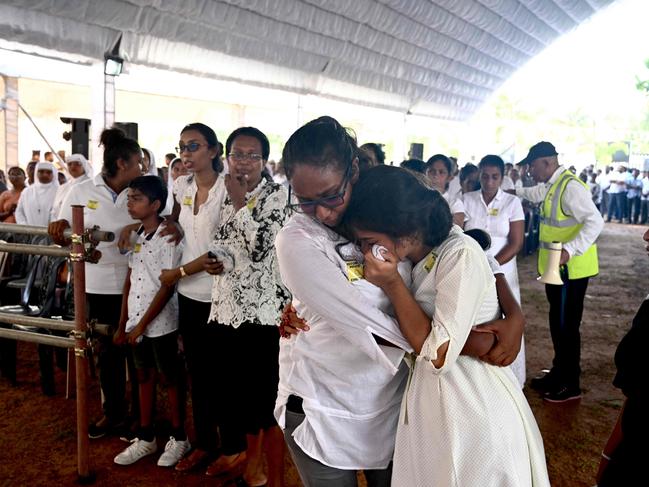
In Darwin, Prime Minister Scott Morrison has paid his respects to those killed in the attacks, including Melbourne mother and daughter Manik and Alexendria Suriaaratchi, at a special l prayer service.
Mr Morrison attended the Sri Lanka-Australia Friendship Association’s Remembrance Prayers at the International Buddhist Centre in Darwin.
Earlier, he confirmed that the Australian Federal Police would be joining Sri Lanka’s investigation effort.
“AFP and our people are now joining the investigation efforts,” he said.
“We’ve made those offers and they’ve been responded to and so we’ll be assisting wherever we can with these investigations.”
Earlier, a state of emergency was imposed on the country at midnight (9am Tuesday AEST), which gives police and the military special powers to counter militant strikes, came into force at midnight.
It also means suspects can be detained without a court order.
The Asia Times reports the video emerged on an ISIS channel, and follows comment from cabinet minister and government spokesman Rajitha Senaratne that local militant group named National Thowfeek Jamaath (NTJ) was responsible.
Mr Senaratne previously said the NTJ were supported by “international networks”, with an Indian senior security official telling the Asia Times: “We believe that the NTJ were only the foot soldiers and the controllers were some one else”.
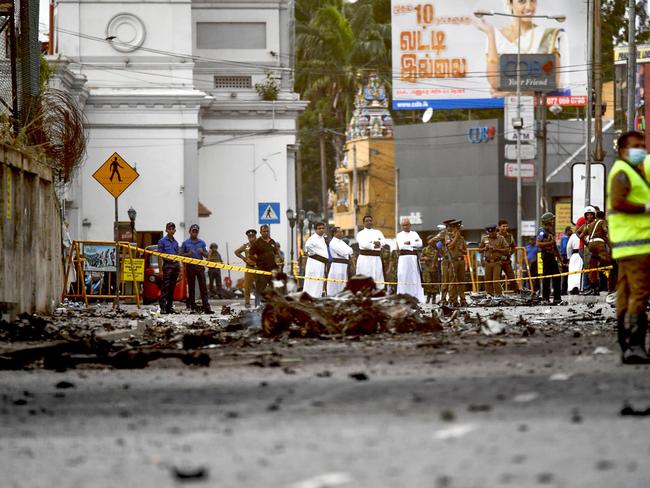
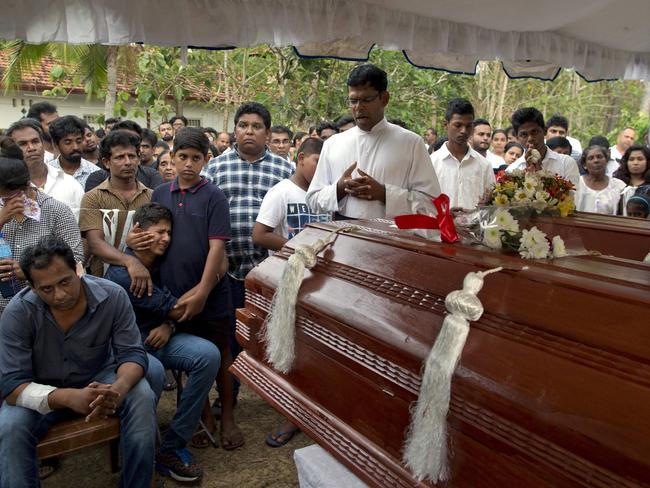
The Arabic-language video says: “Our armies remain in every (mountain and valley); exploding into the bastions of the infidels.”
There has been no official confirmation as to whether the video is genuine. It was not posted on an official IS media channel, but rather, one believed to be run by supporters of the terrorist group.
The video also depicts several people believed to be the suicide bombers connected to the attack, but who are referred to as “assailants” rather than much-used IS term, “martyrs”.
Director of SITE Intelligence Group, Rita Katz, tweeted: “If these are actually pictures of the attackers (though I stress again that these images are not verified as being from #ISIS), the use of the ISIS-associated black banner, instead of any local organization’s, would make further indication of its role in the attacks”.
14) If these are actually pictures of the attackers (though I stress again that these images are not verified as being from #ISIS), the use of the ISIS-associated black banner, instead of any local organization's, would make further indication of its role in the attacks.
— Rita Katz (@Rita_Katz) April 22, 2019
So far, 40 people have been arrested over the Easter Sunday attacks on three churches and three hotels in the capital Colombo and elsewhere, authorities said.
Five hundred people were injured in the blasts, the worst atrocity since the South Asian country’s civil war ended a decade ago.
ANOTHER BOMB GOES OFF
As the death toll rose, another bomb detonated as police prepared to defuse it, and others near one of the targeted churches. Although there was a powerful blast, no injuries were reported.
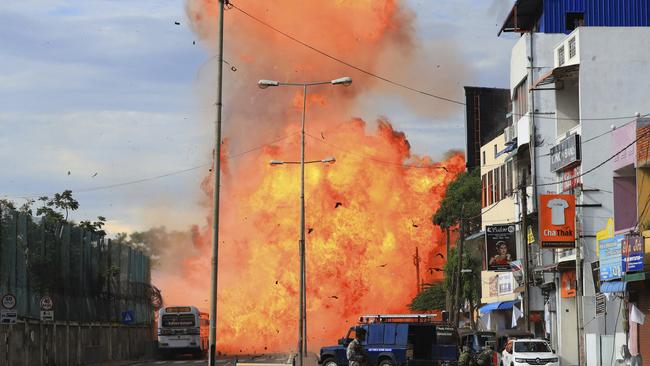
A van was found parked near St Anthony’s Shrine. People reported it looked suspicious after it had remained parked there since Sunday’s bombings.
On inspection police found three bombs they tried to defuse, instead one detonated sending pedestrians fleeing in panic.
Police also found 87 bomb detonators at a Colombo bus station and garbage dump.
The Easter Sunday attacks are the worst ever committed against Sri Lanka’s small Christian minority. This population makes up seven per cent of the country’s 21 million people.
Investigators are now hunting for clues on whether the National Thowheeth Jama’ath (NTJ) group received “international support”, Mr Senaratne told reporters.
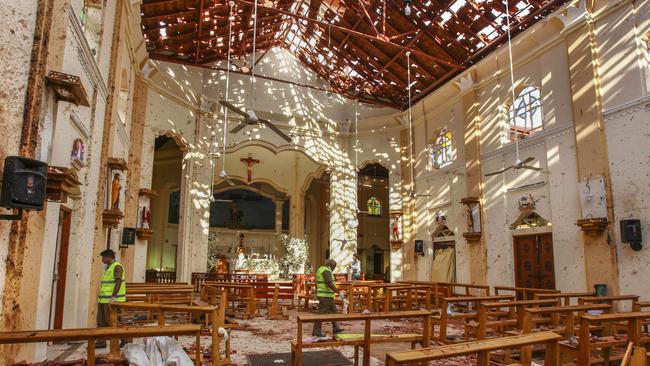
The spokesman added that it was not possible for such “a small organisation” to carry out such well-co-ordinated suicide strikes.
The suicide bombers hit three Colombo luxury hotels popular with foreign tourists; the Cinnamon Grand, the Shangri-La and the Kingsbury, and three churches: two in the Colombo region and one in the eastern city of Batticaloa.
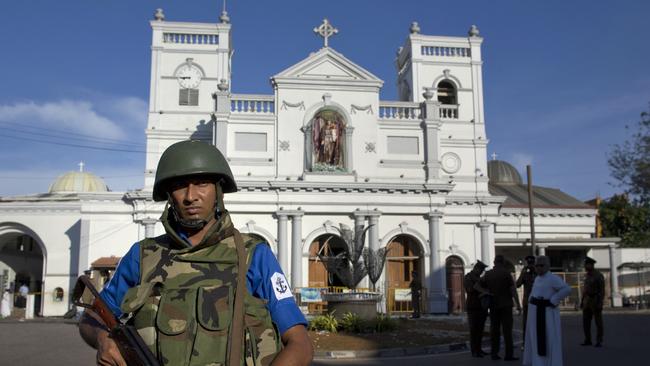
Two additional blasts were triggered as security forces carried out raids searching for suspects.
The state of emergency gives police and military the power to country militant strikes came into effect at midnight local time. It also means suspects can be detained without a court order.
WAS INTEL IGNORED?
Officials are also investigating why more precautions were not taken after an April 11 warning from Sri Lanka’s police that a “foreign intelligence agency” had reported the NTJ planned suicide attacks on churches.
Senaratne said that warning was not passed on to Prime Minister Ranil Wickremesinghe or other top ministers.
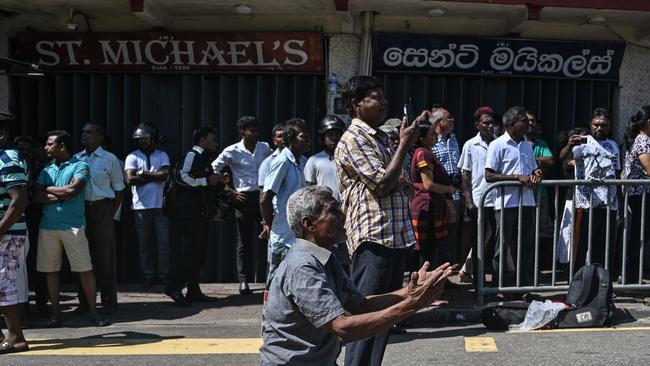
“Intelligence sections have reported that there are international terror groups which are behind local terrorists,” President Maithripala Sirisena’s office said in a statement.
Sirisena was due to meet with foreign diplomats today “to seek international assistance to combat terrorism”, his office said.
Police sources told AFP at least 37 foreigners were killed in a total of nine bombings, but that number is likely to change.
Tributes to Aussie mother and daughter killed in attack
Aussies killed in Sri Lanka massacre
How Aussie victims were injured in Easter massacre
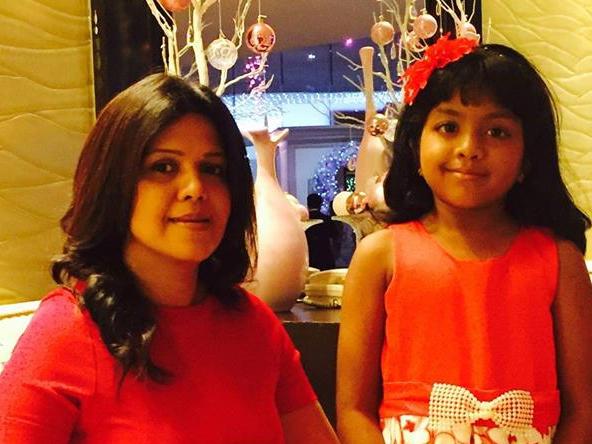
The US claimed at least four Americans died, the Netherlands raised their toll to three, the UK named eight Britons, eight Indians and nationals from Turkey, Australia, France, Japan and Portugal.
Two of those people include a British doctor and a retired firefighter who were living in Australia since 2013. Dr Sally Bradley and her husband Bill Harrop were staying in the Cinnamon Grand Hotel when one of the seven suicide bombers struck.
The couple had been living in Perth since 2013 where Dr Bradley was practising medicine, but were due to return to the UK soon.
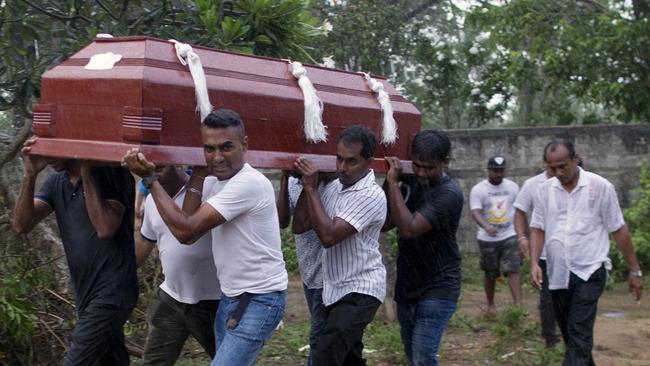
Australian mother Manik Suriaaratchi and her ten-year-old daughter Alexendria were also killed in the attacks.
Tributes have been flowing for the pair, who were killed while attending Easter Mass at a Negombo church.
In a media conference in Melbourne yesterday, Prime Minister Scott Morrison confirmed the tragic deaths.
Two other Australian women were wounded in the blasts.
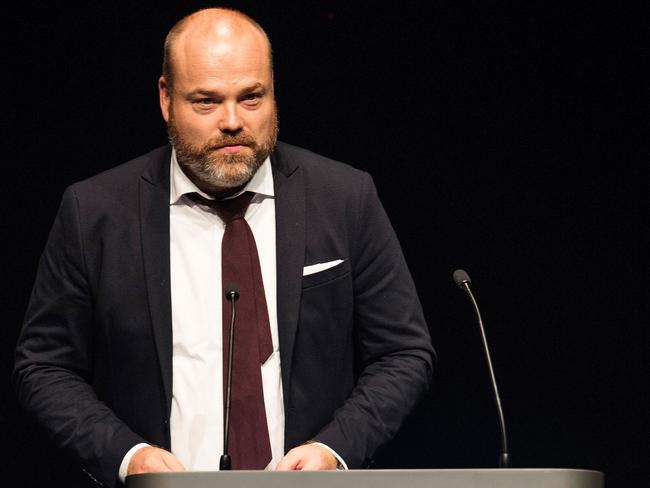
Billionaire ASOS owner Anders Holch Povlsen lost three of his four children in the terror attacks.
Povlsen, Denmark’s richest man, is the second largest private landowner in Britain.
He has four young children with wife Anne Storm — Alma, Astrid, Agnes and Alfred.
Swedish newspaper Aftonbladet said the 46-year-old Holch Povlsen and his wife, Anne Holch Povlsen, were holidaying in Sri Lanka with their children.
RELIGIOUS VIOLENCE PLAGUES REGION
Ethnic and religious violence has plagued Sri Lanka for decades, with a 37-year conflict with Tamil rebels followed by an upswing in recent years in clashes between the Buddhist majority and Muslims.
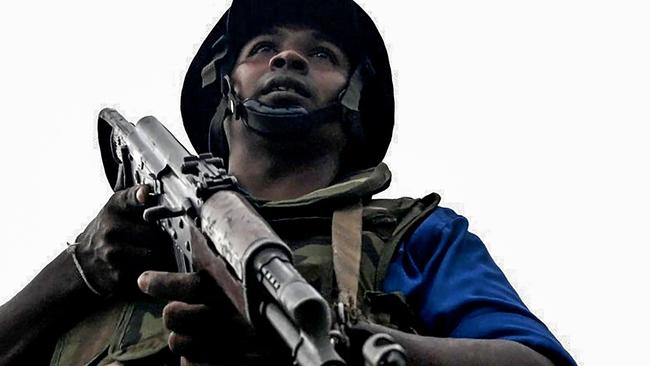
A memorial service and funeral were to be held Tuesday at St Sebastian’s church in Negombo, north of Colombo, where more than 100 people were killed Sunday.
Among the dead were friends of 16-year-old Primasha Fernando, who was at her home nearby when the suicide bomber struck.
“When I got to the church, there were people crying and screaming,” she told AFP.
“I saw bodies everywhere,” she added in tears. “I saw parents carrying their dead babies.” At a government morgue in Colombo, relatives endured the gruesome task of identifying their loved ones.
Janaka Shaktivel, 28, father of an 18-month-old son, sat in shock outside the building waiting for the body of his wife to be handed over.
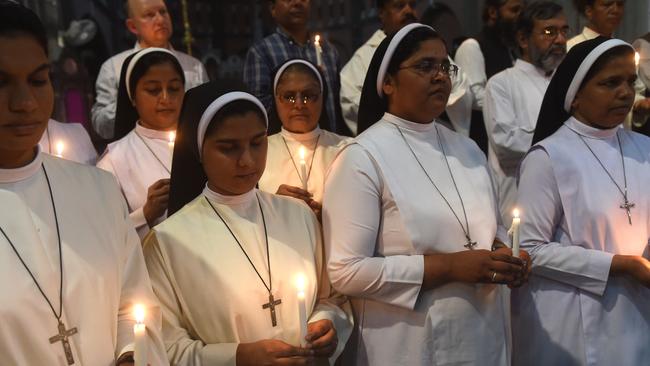
He said he escaped the blast at St Anthony’s Shrine in Colombo because the baby had started crying and he had to go outside.
“I recognised her body from the wedding ring that she always wore,” he said. “I have no words to explain my feelings.”
Two leading Muslim groups issued statements condemning the attacks, with the All Ceylon Jamiyaathuul Ulama, a council of Muslim theologians, urging the “maximum punishment for everyone involved in these dastardly acts.”
The attacks drew global condemnation, including from US President Donald Trump and the pope.
Billionaire loses three kids in Sri Lanka attacks
Bomber queued for breakfast before blast
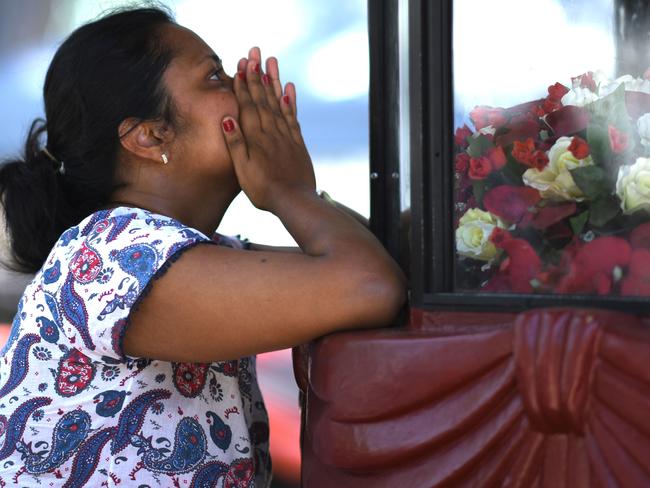
WHO ARE NATIONAL THOWFEEK JAMAATH?
Sri Lankan officials say the local militant group named National Thowfeek Jamaath (NTJ) was responsible for the suicide bombings.
All seven bombers linked to the near-simultaneous attacks were Sri Lankan citizens.
The group is domestic.
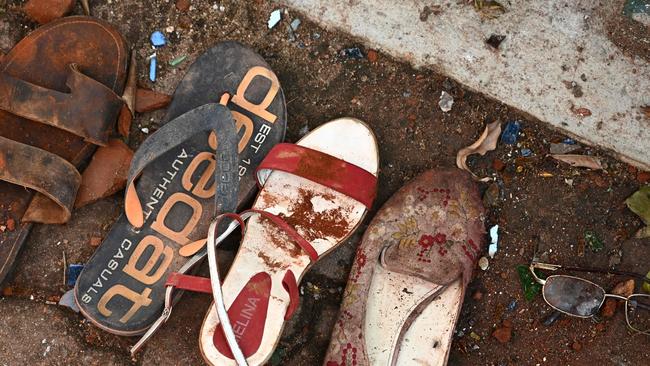
Two of the suicide bombers blew themselves up at the luxury Shangri-La Hotel on Colombo’s seafront senior official at the government’s forensic division Ariyananda Welianga said.
The others targeted three churches and two other hotels. A fourth hotel and a house in a suburb of the capital Colombo were also targeted.
The attacks took place as many hotel guests were sitting down for breakfast or attending Sunday church services.
Sri Lanka’s prime minister says the government did have some knowledge about possible attacks on churches involving the little-known local Islamist group.
Four bombs went off at 8.45am local time on Easter Sunday. Two more blasts occurred within 20 minutes after this.
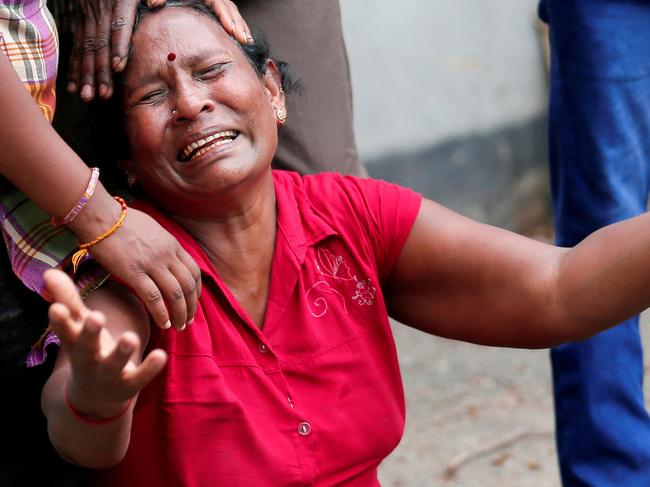
Originally published as Easter Sunday massacre: Sri Lankan terrorists ‘had international help’


